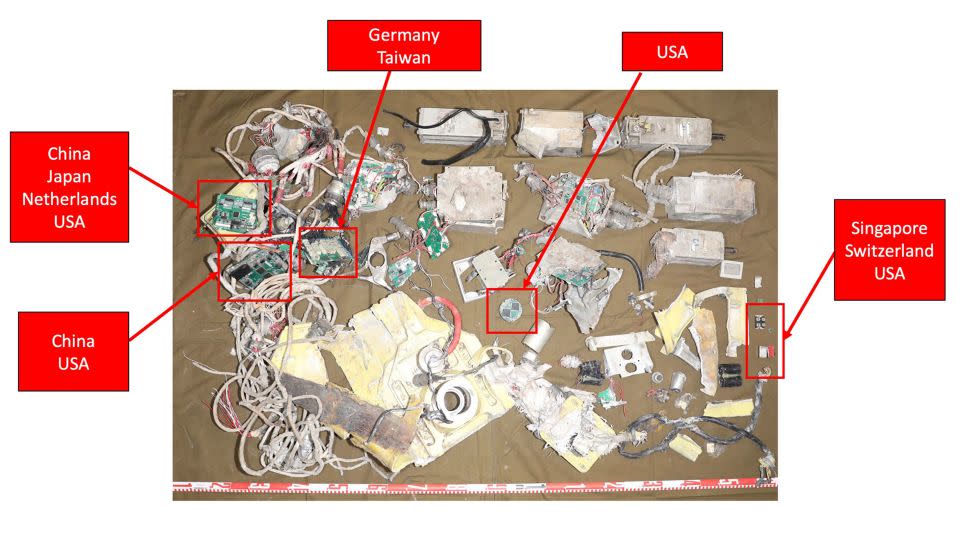Report: North Korean missile fired by Russia against Ukraine contained US and European components
A North Korean ballistic missile fired last month by the Russian military in Ukraine contained hundreds of components that trace back to companies in the US and Europe, according to a new report.
The findings mark the first public identification of North Korea’s reliance on foreign technology for its missile program and underscore the persistent problem facing the Biden administration as it tries to keep cheap, Western-made microelectronics intended for civilian use from winding up in weapons used by North Korea, Iran and Russia.
The UK-based investigative organization Conflict Armament Research, or CAR, directly examined 290 components from remnants of a North Korean ballistic missile recovered in January from Kharkiv, Ukraine, and found that 75% of the components were designed and sold by companies incorporated in the United States, according to the report shared first with CNN.
A further 16% of the components found in the missile were linked to companies incorporated in Europe, the researchers found, and 9% to companies incorporated in Asia. These components primarily comprised the missile’s navigation system and could be traced to 26 companies headquartered in the US, China, Germany, Japan, the Netherlands, Singapore, Switzerland and Taiwan, the report says.
Last year, as CNN previously reported, CAR determined that 82% of components inside Iranian-made attack drones fired by Russia inside Ukraine were made by US companies.
Along with extensive sanctions and export controls aimed at curbing access to Western-made technology, in late 2022 the Biden administration also set up an expansive task force to investigate how US and Western components, including American-made microelectronics, were ending up in Iranian-made drones Russia has been launching by the hundreds into Ukraine.
It is not clear how much progress that task force has made — the National Security Council did not respond to multiple requests for comment.
Circumventing 20 years of sanctions
The latest CAR report does not name the specific companies that produced the components, because there is no evidence the firms deliberately shipped the parts to North Korea — instead, the components were likely diverted somewhere in the vast global supply chain once the companies sold them to various international distributors. CAR therefore prefers to work with the companies to try to fix the problem rather than to name and shame them, a CAR spokesperson told CNN.

The research also shows that North Korea was able to produce the missile and ship it over to Russia quickly. The components examined by the researchers were manufactured between 2021 and 2023. Based on those production dates, the researchers say the missile “could not have been assembled before March 2023” and was being used by Russia in Ukraine by January.
The fact that North Korea’s missile production appears to be fueled by parts originating in the West underscores how difficult it is for the US and its allies to control where commercial electronics are going, particularly semiconductor components that are extremely challenging to track once they enter the global supply chain.
The findings indicate North Korea “has developed a robust acquisition network capable of circumventing, without detection, sanction regimes that have been in place for nearly two decades,” the CAR report says.
And while Russia continues to be supplied by North Korea and Iran, the Biden administration has been unable to send new weaponry and equipment to the Ukrainian military because Congress has not approved the required supplemental funding to do so.
More evidence of Russia, North Korea ties
The White House confirmed last month that Russia has been firing North Korean missiles at Ukrainian cities. North Korea has also likely provided Russia with “millions of artillery rounds” over the last year, according to a report published last week by the Pentagon’s inspector general.
Intelligence officials in Washington are increasingly concerned about the growing ties between North Korea and Russia, CNN previously reported, and the long-term implications of what appears to be a new level of strategic partnership between the two nations.
CAR said its examination of the North Korean missile “shows that North Korea has been able to produce advanced weapons, integrating components produced as recently as 2023, in spite of United Nations Security Council sanctions in place since 2006 that prohibit the production of ballistic missiles by North Korea.”
Russia’s use of North Korean missiles on the battlefield in Ukraine may also give Pyongyang data it can’t get from a testing program that has seen dozens of the weapons fired over the past few years under leader Kim Jong Un.
North Korea may also be seeking military assistance from Russia including “fighter aircraft, surface-to-air missiles, armored vehicles, ballistic missile production equipment, war materials and other advanced technologies,” National Security Council spokesperson John Kirby said last month.
“This would have concerning security implications for the Korean Peninsula and the Indo-Pacific region,” he added.
For more CNN news and newsletters create an account at CNN.com


